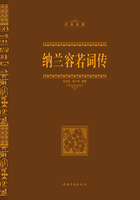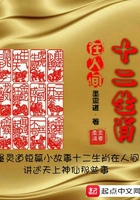As for me,I am old,but he so young,so good,so gentle.'And she cried--yes,she cried incessantly.'Who is it that you think wants to harm M.Andre?'I asked her.Then she turned away from me with a look of distrust that cut me to the heart,although I knew that her head was astray.The doctor says that she believes herself persecuted,and that it is a mania;he also says that she may recover,but will never have her speech again."I listened to Julie's talk in silence;I made no answer.I was not surprised that my Aunt Louise had begun to be attacked by a mental malady;the trials of her life sufficiently explained this,and Icould also account for several singularities that I had observed in her attitude towards me of late.She had surprised me much by asking me to bring back a book of my father's which I had never thought of taking away."Return it to me,"she said,insisting upon it so strongly,that I instituted a search for the book,and at last unearthed it from the bottom of a cupboard where it had been placed,as if on purpose,under a heap of other books.
Julie's prolix narrative only enlightened me as to the sad cause of what I had taken for the oddity of a fidgety and lonely old maid.
On the other hand,I could not take the ideas of my father's death so philosophically as Julie accepted them.What were those ideas?
Many a time,in the course of conversation with her,I had vaguely felt that she was not opening her heart quite freely to me.Her determined opposition to my plans of a personal inquiry might proceed from her piety,which would naturally cause her to disapprove of any thought or project of vengeance,but was there nothing else,nothing besides that piety in question?Her strange solicitude for my personal safety,which even led her to entreat me not to go out unarmed in the evening,or get into an empty compartment in a train,with other counsels of the same kind,was no doubt caused by morbid excitement;still her constant and distressing dread might possibly rest upon a less vague foundation than I imagined.
I also recalled,with a certain apprehension,that so soon as she ceased to be able completely to control her mind these strange fears took stronger possession of her than before."What!"said Ito myself,"am I becoming like her,that I let such things occur to me?Are not these fixed ideas quite natural in a person whose brain is racked by the mania of persecution,and who has lost a beloved brother under circumstances equally mysterious and tragical?""She is awake,"said Julie,who had taken the maid's place at the foot of the bed.I approached my aunt and called her by her name.
I then clearly saw her poor face distorted by paralysis.
She recognized me,and as I bent down to kiss her,she stroked my cheek with her sound hand.This caress,which was habitual with her,she repeated slowly several times.I placed her,with Julie's assistance,on her back,so that she could see me distinctly;she looked at me for a long time,and two heavy tears fell from the eyes in which I read boundless tenderness,supreme anguish,and inexpressible pity.I answered them by my own tears,which she dried with the back of her hand;then she strove to speak to me,but could only pronounce an incoherent sentence that struck me to the heart.She saw,by the expression of my face,that I had not understood her,and she made a desperate effort to find words in which to render the thought evidently precise and lucid in her mind.Once more she uttered an unintelligible phrase,and began again to make the feeble gesture of despairing helplessness which had so shocked me at her waking.She appeared,however,to take courage when I put the question to her:"What do you want of me,dear aunt?"She made a sign that Julie was to leave the room,and no sooner were we alone than her face changed.With my help she was able to slip her hand under her pillow,and withdraw her bunch of keys;then separating one key from the others she imitated the opening of a lock.I immediately remembered her groundless fears of being robbed and I asked her whether she wanted the box to which that key belonged.It was a small key of a kind that is specially made for safety locks.I saw that I had guessed aright;she was able to get out the word "yes,"and her eyes brightened.
"But where is this box?"I asked.Once more she replied by a sentence of which I could make nothing;and,seeing that she was relapsing into a state of agitation,with the former heart-rending movement,I begged her to allow me to question her and to answer by gestures only.After some minutes,I succeeded in discovering that the box in question was locked up in one of the two large cupboards below stairs,and that the key of the cupboard was on the ring with the others.I went downstairs,leaving her alone,as she had desired me by signs to do.I had no difficulty in finding the casket to which the little key adapted itself;although it was carefully placed behind a bonnet-box and a case of silver forks.
The casket was of sweet-scented wood,and the initials J.C.were inlaid upon the lid in gold and platinum.J.C.,Justin Cornelies--so,it had belonged to my father.I tried the key in the lock,to make quite sure that I was not mistaken.
I then raised the lid,and glanced at the contents almost mechanically,supposing that I was about to find a roll of business papers,probably shares,a few trinket-cases,and rouleaux of napoleons,a small treasure in fact,hidden away from motives of fear.Instead of this,I beheld several small packets carefully wrapped in paper,each being endorsed with the words,"Justin's Letters,"and the year in which they were written.My aunt had preserved these letters with the same pious care that had kept her from allowing anything whatever belonging to him in whom the deepest affection of her life had centered,to be lost,parted with,or injured.
But why had she never spoken to me of this treasure,which was more precious to me than to anyone else in the world?I asked myself that question as I closed the box;then I reflected that no doubt she desired to retain the letters to the last hour of her life;and,satisfied with this explanation,I went upstairs again.
From the doorway my eyes met hers,and I could not mistake their look of impatience and intense anxiety.I placed the little coffer on her bed and she instantly opened it,took out a packet of letters,then another,finally kept only one out,replaced those she had removed at first,locked the box,and signed to me to place it on the chest of drawers.While I was clearing away the things on the top of the drawers,to make a clear space for the box,Icaught sight,in the glass opposite to me,of the sick woman.By a great effort she had turned herself partly on her side,and she was trying to throw the packet of letters which she had retained into the fireplace;it was on the right of her bed,and only about a yard away from the foot.But she could hardly raise herself at all,the movement of her hand was too weak,and the little parcel fell on the floor.I hastened to her,to replace her head on the pillows and her body in the middle of the bed,and then,with her powerless arm she again began to make that terrible gesture of despair,clutching the sheet with her thin fingers,while tears streamed from her poor eyes.
Ah!how bitterly ashamed I am of what I am going to write in this place!I will write it,however,for I have sworn to myself that Iwill be true,even to the avowal of that fault,even to the avowal of a worse still.I had no difficulty in understanding what was passing in my aunt's mind;the little packet--it had fallen on the carpet close to the fender--evidently contained letters which she wished to destroy,so that I should not read them.She might have burned them,dreading as she did their fatal influence upon me,long since;yet I understood why she had shrunk from doing this,year after year,I,who knew with what idolatry she worshipped the smallest objects that had belonged to my father.Had I not seen her put away the blotting-book which he used when he came to Compiegne,with the paper and envelopes that were in it at his last visit?
Yes,she had gone on waiting,still waiting,before she could bring herself to part forever with those dear and dangerous letters,and then her sudden illness came,and with it the terrible thought that these papers would come into my possession.I could also take into account that the unreasonable distrust which she had yielded to of late had prevented her from asking Jean or Julie for the little coffer.This was the secret--I understood it on the instant--of the poor thing's impatience for my arrival,the secret also of the trouble I had witnessed.And now her strength had betrayed her.
She had vainly endeavored to throw the letters into the fire,that fire which she could hear crackling,without being able to raise her head so as to see the flame.All these notions which presented themselves suddenly to my thoughts took form afterwards;at the moment they melted into pity for the suffering of the helpless creature before me.
"Do not disturb yourself,dear aunt,"said I,as I drew the coverlet up to her shoulders,"I am going to burn those letters."She raised her eyes,full of eager supplication.I closed the lids with my lips and stooped to pick up the little packet.On the paper in which it was folded,I distinctly read this date:"1864--Justin's letters."1864!that was the last year of my father's life.I know it,I feel it,that which I did was infamous;the last wishes of the dying are sacred.I ought not,no,I ought not to have deceived her who was on the point of leaving me forever.Iheard her breathing quicken at that very moment.Then came a whirlwind of thought too strong for me.If my Aunt Louise was so wildly,passionately eager that those letters should be burned,it was because they could put me on the right track of vengeance.
Letters written in the last year of my father's life,and she had never spoken of them to me!I did not reason,I did not hesitate,in a lightning-flash I perceived the possibility of learning--what?
I know not;but--of learning.Instead of throwing the packet of letters into the fire,I flung it to one side,under a chair,returned to the bedside and told her in a voice which I endeavored to keep steady and calm,that her directions had been obeyed,that the letters were burning.She took my hand and kissed it.Oh,what a stab that gentle caress inflicted upon me!I knelt down by her bedside,and hid my head in the sheets,so that her eyes should not meet mine.Alas!it was not for long that I had to dread her glance.At ten she fell asleep,but at noon her restlessness recurred.At two the priest came,and administered the last sacraments to her.She had a second stroke towards evening,never recovered consciousness,and died in the night.
VI
At three o'clock in the morning Julie came in to take my place,and I retired to my room,which was on the same floor as my aunt's.Aboxroom divided the two.I threw myself on my bed,worn out with fatigue,and nature triumphed over my grief.I fell into that heavy sleep which follows the expenditure of nerve power,and from which one awakes able to bear life again and to carry the load that seemed unendurable.When I awoke it was day,and the wintry sky was dull and dark like that of yesterday,but it also wore a threatening aspect,from the great masses of black cloud that covered it.I went to the window and looked out for a long time at the gloomy landscape closed in by the edge of the forest.I note these small details in order that I may more faithfully recall my exact impression at the time.In turning away from the window and going towards the fire which the maid had just lighted,my eye fell upon the packet of letters stolen from my aunt.Yes,stolen--'tis the word.It was in the place where I had put it last night,on the mantel-shelf,with my purse,rings,and cigar-case.I took up the little parcel with a beating heart.I had only to stretch out my hand and those papers would fall into the flames and my aunt's dying wish be accomplished.I sank into an easy-chair and watched the yellow flame gaining on the logs,while I weighed the packet in my hand.I thought there must be a good many letters in it.Isuffered from the physical uneasiness of indecision.I am not trying to justify this second failure of my loyalty to my dear aunt,I am trying to understand it.
Those letters were not mine,I never ought to have appropriated them.I ought now to destroy them unopened;all the more that the excitement of the first moment,the sudden rush of ideas which had prevented me from obeying the agonized supplication of my poor aunt,had subsided.I asked myself once more what was the cause of her misery,while I gazed at the inion upon the cover,in my aunt's hand:"Justin's Letters,1864."The very room which Ioccupied was an evil counsellor to me in this strife between an indisputable duty and my ardent desire to know;for it had formerly been my father's room,and the furniture had not been changed since his time.The color of the hangings was faded,that was all.He had warmed himself by a fire which burned upon that self-same hearth,and he had used the same low,wide chair in which I now sat,thinking many somber thoughts.He had slept in the bed from which I had just risen,he had written at the table on which Irested my arms.No,that room deprived me of free will to act,it made my father too living.It was as though the phantom of the murdered man had come out of his grave to entreat me to keep the oft-sworn vow of vengeance.Had these letters offered me no more than one single chance,one against a thousand,of obtaining one single indication of the secrets of my father's private life,Icould not have hesitated.With such sacrilegious reasoning as this did I dispel the last scruples of pious respect;but I had no need of arguments for yielding to the desire which increased with every moment.
I had there before me those letters,the last his hand had traced;those letters which would lay bare to me the recesses of his life,and I was not to read them!What an absurdity!Enough of such childish hesitation.I tore off the cover which hid the papers;the yellow sheets with their faded characters shook in my hands.Irecognized the compact,square,clear writing,with spaces between the words.The dates had been omitted by my father in several instances,and then my aunt had repaired the omission by writing in the day of the month herself.My poor aunt!this pious carefulness was a fresh testimony to her constant tenderness;and yet,in my wild excitement I no longer thought of her who lay dead within a few yards of me.
Presently Julie came to consult me upon all the material details which accompany death;but I told her I was too much overwhelmed,that she must do as she thought fit,and leave me quite alone for the whole of the morning.Then I plunged so deeply into the reading of the letters,that I forgot the hour,the events taking place around me,forgot to dress myself,to eat,even to go and look upon her whom I had lost while yet I could behold her face.
Traitor and ingrate that I was!I had devoured only a few lines before I understood only too well why she had been desirous to prevent me from drinking the poison which entered with each sentence into my heart,as it had entered into hers.Terrible,terrible letters!Now it was as though the phantom had spoken,and a hidden drama of which I had never dreamed unfolded itself before me.
I was quite a child when the thousand little scenes which this correspondence recorded in detail took place.I was too young then to solve the enigma of the situation;and,since,the only person who could have initiated me into that dark history was she who had concealed the existence of the too-eloquent papers from me all her life long,and on her deathbed had been more anxious for their destruction than for her eternal salvation--she,who had no doubt accused herself of having deferred the burning of them from day to day as of a crime.When at last she had brought herself to do this,it was too late.
The first letter,written in January,1864,began with thanks to my aunt for her New Year's gift to me--a fortress with tin soldiers--with which I was delighted,said the letter,because the cavalry were in two pieces,the man detaching himself from his horse.
Then,suddenly,the commonplace sentences changed into utterances of mournful tenderness.An anxious mind,a heart longing for affection,and discontent with the existing state of things,might be discerned in the tone of regret with which the brother dwelt upon his childhood,and the days when his own and his sister's life were passed together.There was a repressed repining in that first letter that immediately astonished and impressed me,for I had always believed my father and mother to have been perfectly happy with each other.Alas!that repining did but grow and also take definite form as I read on.My father wrote to his sister every Sunday,even when he had seen her in the course of the week.As it frequently happens in cases of regular and constant correspondence,the smallest events were recorded in minute detail,so that all our former daily life was resuscitated in my thoughts as I perused the lines,but accompanied by a commentary of melancholy which revealed irreparable division between those whom I had believed to be so closely united.Again I saw my father in his dressing-gown,as he greeted me in the morning at seven o'clock,on coming out of his room to breakfast with me before I started for school at eight.He would go over my lessons with me briefly,and then we would seat ourselves at the table (without a tablecloth)in the dining-room,and Julie would bring us two cups of chocolate,deliciously sweetened to my childish taste.My mother rose much later,and,after my school days,my father occupied a separate room in order to avoid waking her so early.How I enjoyed that morning meal,during which I prattled at my ease,talking of my lessons,my exercises,and my schoolmates!What a delightful recollection Iretained of those happy,careless,cordial hours!In his letters my father also spoke of our early breakfasts,but in a way that showed how often he was wounded by finding out from my talk that my mother took too little care of me,according to his notions--that Ifilled too small a place in her dreamy,wilfully frivolous life.
There were passages which the then future had since turned into prophecies."Were I to be taken from him,what would become of him?"was one of these.At ten I came back from school;by that time my father would be occupied with his business.I had lessons to prepare,and I did not see him again until half-past eleven,at the second breakfast.Then mamma would appear in one of those tasteful morning costumes which suited her slender and supple figure so well.From afar,and beyond the cold years of my boyhood,that family table came before me like a mirage of warm homelife;how often had it become a sort of nostalgia to me when Isat between my mother and M.Termonde on my horrid half-holidays.
And now I found proof in my father's letters that a divorce of the heart already existed between the two persons who,to my filial tenderness,were but one.My father loved his wife passionately,and he felt that his wife did not love him.This was the feeling continually expressed in his letters--not in words so plain and positive,indeed;but how should I,whose boyhood had been strangely analogous with this drama of a man's life,have failed to perceive the secret signification of all he wrote?My father was taciturn,like me--even more so than I--and he allowed irreparable misunderstandings to grow up between my mother and himself.Like me afterwards,he was passionate,awkward,hopelessly timid in the presence of that proud,aristocratic woman,so different from him,the self-made man of almost peasant origin,who had risen to professional prosperity by the force of his genius.Like me--ah!not more than I--he had known the torture of false positions,which cannot be explained except by words that one will never have courage to utter.And,oh,the pity of it,that destiny should thus repeat itself;the same tendencies of the mind developing themselves in the son after they had developed themselves in the father,so that the misery of both should be identical!
My father's letters breathed sighs that my mother had never suspected--vain sighs for a complete blending of their two hearts;tender sighs for the fond dream of fully-shared happiness;despairing sighs for the ending of a moral separation,all the more complete because its origin was not to be sought in their respective faults (mutual love pardons everything),but in a complete,almost animal,contrast between the two natures.Not one of his qualities was pleasing to her;all his defects were displeasing to her.And he adored her.I had seen enough of many kinds of ill-assorted unions since I had been going about in society,to understand in full what a silent hell that one must have been,and the two figures rose up before me in perfect distinctness.I saw my mother with her gestures--a little affectation was,so to speak,natural to her--the delicacy of her hands,her fair,pale complexion,the graceful turn of her head,her studiously low-pitched voice,the something un-material that pervaded her whole person,her eyes,whose glance could be so cold,so disdainful;and,on the other hand,I saw my father with his robust,workingman's frame,his hearty laugh when he allowed himself to be merry,the professional,utilitarian,in fact,plebeian,aspect of him,in his ideas and ways,his gestures and his discourse.But the plebeian was so noble,so lofty in his generosity,in his deep feeling.He did not know how to show that feeling;therein lay his crime.On what wretched trifles,when we think of it,does absolute felicity or irremediable misfortune depend!
The name of M.Termonde occurred several times in the earlier letters,and,when I came to the eleventh,I found it mentioned in a way which brought tears to my eyes,set my hands shaking,and made my heart leap as at the sound of a cry of sharp agony.In the pages which he had written during the night--the writing showed how deeply he was moved--the husband,hitherto so self-restrained,acknowledged to his sister,his kind and faithful confidante,that he was jealous.He was jealous,and of whom?Of that very man who was destined to fill his place at our fireside,to give a new name to her who had been Madame Cornelis;of the man with cat-like ways,with pale eyes,whom my childish instinct had taught me to regard with so precocious and so fixed a hate.He was jealous of Jacques Termonde.In his sudden confession he related the growth of this jealousy,with the bitterness of tone that relieves the heart of misery too long suppressed.In that letter,the first of a series which death only was destined to interrupt,he told how far back was the date of his jealousy,and how it awoke to life with his detection of one look cast at my mother by Termonde.He told how he had at once suspected a dawning passion on the part of this man,then that Termonde had gone away on a long journey,and that he,my father,had attributed his absence to the loyalty of a sincere friend,to a noble effort to fight from the first against a criminal feeling.Termonde came back;his visits to us were soon resumed,and they became more frequent than before.There was every reason for this;my father had been his chum at the Ecole de Droit,and would have chosen him to be his best man at his marriage had not Termonde's diplomatic functions kept him out of France at the time.In this letter and the following ones my father acknowledged that he had been strongly attached to Termonde,so much so,indeed,that he had considered his own jealousy as an unworthy feeling and a sort of treachery.But it is all very well to reproach one's self for a passion;it is there in our hearts all the same,tearing and devouring them.After Termonde's return,my father's jealousy increased,with the certainty that the man's love for the wife of his friend was also growing;and yet,the unhappy husband did not think himself entitled to forbid him the house.
Was not his wife the most pure and upright of women?Her very inclination to mysticism and exaggerated devotion,although he sometimes found fault with her for it,was a pledge that she would never yield to anything by which her conscience could be stained.
Besides,Termonde's assiduity was accompanied by such evident,such absolute respect,that it afforded no ground for reproach.What was he to do?Have an explanation with his wife--he who could not bring himself to enter upon the slightest discussion with her?
Require her to decline to receive his own friend?But,if she yielded,he would have deprived her of a real pleasure,and for that he should be unable to forgive himself.If she did not yield?
So,my poor father had preferred to toss about in that Gehenna of weakness and indecision wherein dwell timid and taciturn souls.
All this misery he revealed to my aunt,dwelling upon the morbid nature of his feelings,imploring advice and pity,deciding and blaming the puerility of his jealousy,but jealous all the same,unable to refrain from recurring again and again to the open wound in his heart,and incapable of the energy and decision that would have cured it.















